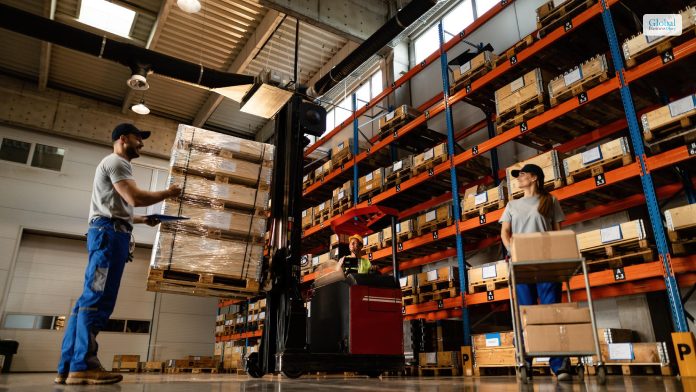What Is Wholesale Distribution? – Importance, Benefits, And Examples

If you are a manufacturer or considering starting your manufacturing business or wholesaling business, you will need to have a good idea of the supply chain. With the help of wholesalers and distributors, most manufacturers move their products to the market. Hence, wholesaling and distribution serve important functions in the supply chain of companies. However, businesses that do both wholesaling and distribution fall under wholesale distribution.
In this article, you will learn about wholesale distribution systems and how they work in the supply chain management of a business. Here, we will discuss various aspects and importance of such systems. Apart from that, you will also get a brief idea of the functions of wholesale distribution systems. Finally, we will discuss the major pros and cons of wholesale distribution systems. Hence, to learn more, read on through to the end of the article.
What Is Wholesale Distribution?

According to Indeed.com,
“Wholesaling distribution is the method of delivering goods from a manufacturer to its customers through various distribution channels that make up a company’s supply chain. While some manufacturers may sell their products directly to consumers, others can use intermediaries to supply their offerings to retailers or other end-users.”
The intermediaries that exist in such a distribution process include wholesalers as well as distributors. Most of the companies in wholesale distribution include both of these functions in their processes. These wholesalers purchase products from manufacturers or distributors in bulk, mostly at a discounted price, and sell each of these products at a profit.
In some cases, in a supply chain, there are various categories of wholesale distributors, where larger wholesale distributors supply to smaller wholesale distributors. These smaller wholesale distributors then supply to retailers, who sell small quantities to customers.
Read More: Entrepreneurship In Economics: What Role Do Entrepreneurs Play In Economics?
How Does Wholesale Distribution Work? – Importance

According to Investopedia,
“Wholesaling is the act of buying goods in bulk from a manufacturer at a discounted price and selling to a retailer for a higher price, for them to repackage and in turn resell in smaller quantities at an even higher price to consumers. Due to the large quantities purchased from the manufacturer at a discounted price, the wholesaler can also pass on this discount to retailers. The retailer sells at a price that reflects the overall cost of doing business.”
As the product reaches the final consumer from the manufacturer, the wholesale distributor plays a vital role in between as a middleman. The wholesale distributor purchases products in bulk from manufacturers and distributes these products to retailers. These businesses or individuals make sure that stores have enough products to sell while the manufacturers can focus more on developing and creating new products.
Wholesale distributors play a major role in the economy, account for more than 400K establishments in the United States itself, and contribute to a combined sales of $9 trillion.
However, in recent times, wholesale distribution companies are facing rapid changes in the economy due to a number of factors. These factors include new competition, growth of eCommerce wholesalers, as well as rising expectations among customers.
What Are The Functions Of Wholesale Distribution?

In general, wholesale distribution systems are responsible for acquiring goods, storing them, and preparing them for sale in smaller numbers to consumers. The success of a wholesale distribution system depends upon gaining a good understanding of the needs and demands of consumers. Furthermore, they also get a good idea of the trends in the market, costs, as well as price points.
In addition to that, as a wholesale distributor, you also need to maintain strong relationships with business partners, other wholesalers, and manufacturers as well. Moreover, you must also ensure that the operational efficiency of the wholesale distribution system is maximized with each stage.
As a wholesale distributor, you will need to look for “upstream” relationships with suppliers or manufacturers of goods and services. Maintaining “downstream” relationships is also important as it will give you a greater idea of the needs and demands of customers through the retailers who buy in bulk from you.
What Are The Pros And Cons Of Wholesale Distribution?

According to NetSuite.com,
“Success in wholesale distribution hinges on gaining a good understanding of customer needs, market trends, costs and price points; building strong relationships with business partners; and maximizing operational efficiency. Wholesale distributors must build solid “upstream” relationships with the suppliers or manufacturers of the goods they buy in bulk.”
The following are the major pros and cons of wholesaling distribution:
Pros Of Wholesaling Distribution
Here are the top pros of wholesale distribution from which you can expect various benefits:
- You will have an increased reach in the supply chain, which will enable you to earn more profits.
- Wholesale distributors help simplify business operations for both retailers and manufacturers.
- In many cases, wholesale distributors help in lowering the cost of products and services, thereby lowering the overall cost of business.
- Due to having huge storage capacities, wholesale distribution companies free manufacturers and retailers from the burden of warehouse storage in many cases.
- As wholesale distributors purchase and maintain inventory, they are able to secure a stable supply of products. Thereby, they reduce the risk of shortages.
Cons Of Wholesaling Distribution
Here are a few cons of wholesale distribution that you need to be aware of:
- There is huge competition.
- In many cases, manufacturers like to sell directly by taking on the role of wholesale distributors and retailers.
- Continuous changes in consumer expectations pose a challenge for wholesale distributors.
- Due to tremendous downward pressure on prices, many wholesale distributors are leaving business.
Final Thoughts
Hope this article was helpful for you in getting a better understanding of the wholesale distribution system. Basically, such wholesale distributors purchase goods from manufacturers in high amounts and sell them at a higher rate to retailers for profit. Retailers also buy in bulk from wholesale distributors, thereby saving their own costs.
Primarily, the process of wholesale distribution is a step in the entire supply chain that is a supplier of bulk products or raw materials, which goes to the retailer and ends with consumers. The retailer sells smaller items to consumers, thus earning profit. Do you have any more information regarding wholesale distribution? Share with us in the comments section below.
Need More Business Related Information!













